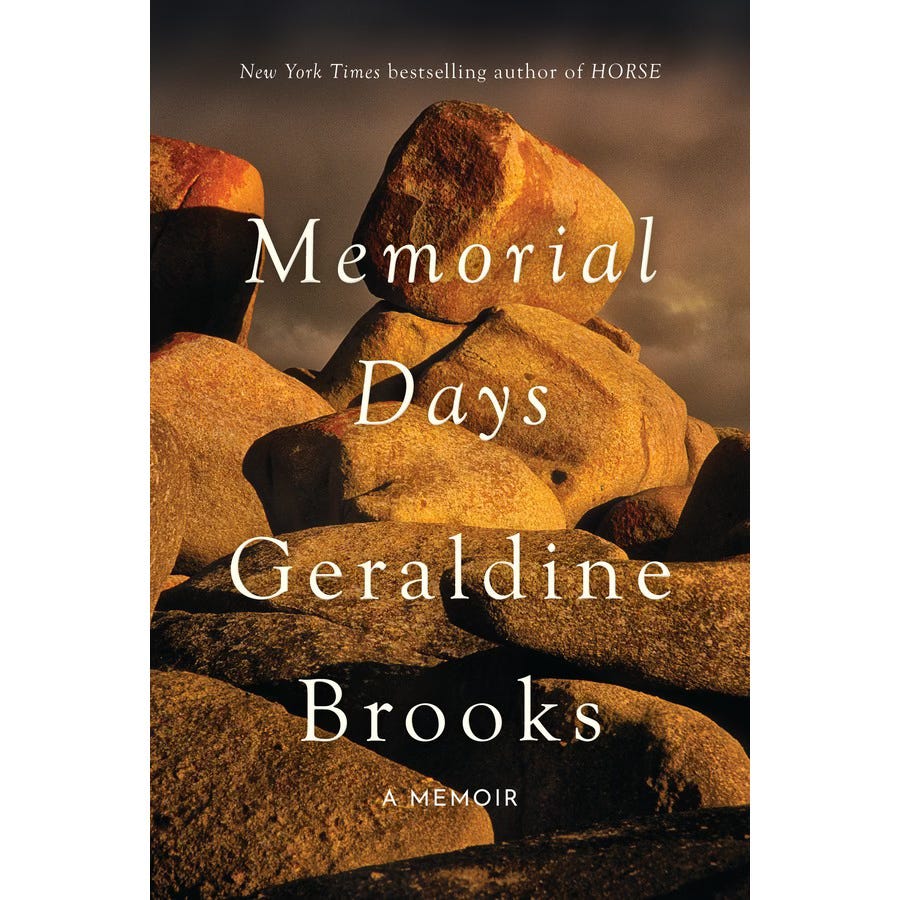Take Back The Frame Book Review: Memorial Days by Geraldine Brooks
Grief, Loss & the Life That Comes After
Why I’m Starting This Book Review Segment
Books, reading, and writing have always been my private sanctuary, a place I retreat to for restoration and recalibration. After being seriously injured at work, that sanctuary disappeared. Depression robbed me of the ability to focus or comprehend even simple text, and with that, a core part of who I was.
This new segment on Take Back The Frame is my way of reclaiming that space, and inviting you into it.
Why This Book, and Why Now?
With International Workers’ Memorial Day coming up on April 28, Memorial Days by Geraldine Brooks feels especially timely. This short but searing memoir reflects on the death of Brooks’ partner of more than three decades, journalist Tony Horwitz, an event that ruptured her life and reshaped it forever.
It’s not about workplace death in the traditional sense, but it speaks to the universal experience of grief, sudden loss, and the disorientation that follows. Horwitz, before becoming a Pulitzer Prize-winning journalist, was a union rep in Mississippi. His life, and sudden death, echoed far beyond his immediate circle.
The Memoir: Chaos, Clarity, and the Contours of Grief
Memorial Days begins with Horwitz’s sudden collapse on a Washington, D.C. street in May 2019. He was just 60. What follows is not just a recounting of loss but an immersion into it.
The memoir is structured around a dual timeline: the immediate aftermath of Horwitz’s death, and Brooks’ later retreat to remote Flinders Island off the coast of Tasmania. Through this lens, she explores both the chaotic logistics of death and the deeper, quieter work of mourning that unfolds in isolation.
Brooks writes with aching honesty about regret and missed warnings. Horwitz died of myocarditis, likely exacerbated by the stress of writing and promoting his latest book. Brooks doesn’t shy away from her guilt, writing,
“Now, I wish I'd been a nagging wife, a regular harridan, issuing ultimatums about self-destructive habits.”
More Than Personal: A Universal Companion in Loss
This memoir goes far beyond a single story of grief. It’s a reflection many of us can relate to, especially those who’ve faced chronic illness, sudden trauma, life-altering injury, or even the loss of a future we thought we’d have.
Brooks captures the paradox of grief: needing to hold space for it while navigating a world that expects efficiency.
“I neglected proper mourning,” she writes, “handling practical matters while emotionally unraveling.”
If you’ve ever delayed your healing to care for others, or simply survive, this will feel familiar.
The Language of Loss—and of Hope
Brooks' prose is luminous and precise. She describes grief as
“a beast clinging to me, claws intractable as fishhooks,”
and speaks of the harsh beauty of Flinders Island:
“It’s windy enough to blow the milk out of your tea.”
These details bring texture to emotion, something mere analysis never quite captures.
Lessons for Life’s Disruptions
Without being preachy or prescriptive, Brooks offers subtle reminders:
Keep your affairs in order.
Don’t ignore warning signs in yourself or others.
Tend to your relationships while you still can.
By the book’s end, she hasn't found closure, but something better. A commitment to continue living fully and intentionally:
“Making the life I have as vivid and consequential as I can.”
It’s not a story of “moving on,” but of transformation, carrying loss as part of who we become.
Final Thoughts
Whether you are grieving the death of a loved one, the loss of your health, your career, or your sense of self after injury or injustice, Memorial Days offers rare companionship.
Geraldine Brooks reminds us that there is no timetable for grief. That it’s okay to step away. That healing begins when we allow ourselves to feel fully, without shame.
Let yourself feel. Let yourself stop. Let yourself read.
And when you’re ready, this book will be waiting for you.




